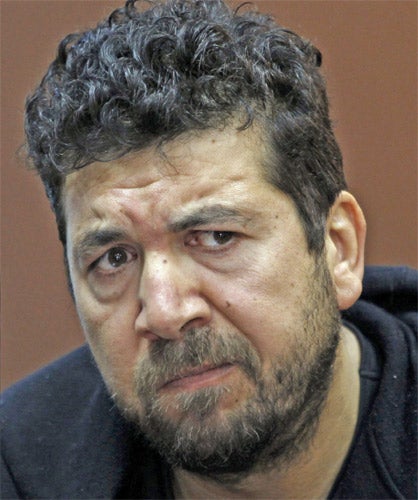Captured Libyan from Manchester shown on TV

Your support helps us to tell the story
From reproductive rights to climate change to Big Tech, The Independent is on the ground when the story is developing. Whether it's investigating the financials of Elon Musk's pro-Trump PAC or producing our latest documentary, 'The A Word', which shines a light on the American women fighting for reproductive rights, we know how important it is to parse out the facts from the messaging.
At such a critical moment in US history, we need reporters on the ground. Your donation allows us to keep sending journalists to speak to both sides of the story.
The Independent is trusted by Americans across the entire political spectrum. And unlike many other quality news outlets, we choose not to lock Americans out of our reporting and analysis with paywalls. We believe quality journalism should be available to everyone, paid for by those who can afford it.
Your support makes all the difference.A Libyan who has lived in Manchester for a decade and was arrested in Zawiya 10 days ago said yesterday that he was sorry for his part in the uprising and had a change of heart because of foreign intervention in the country's internal affairs.
Salah Aboaodah, 44, a member of the Libyan Islamist Fighting Group (LIFG), whose wife and children are at home in Manchester, was presented to the foreign press here yesterday by his Gaddafi regime captors.
Mr Aboaodah, who has dual Libyan and British nationality after seeking asylum in the UK, said he had been a relatively low level fundraiser for the group. He was detained by plain-clothed security forces in a street off the main square of Zawiya. The town, west of Tripoli, saw fierce fighting between pro- and anti-Gaddafi forces until it was recaptured by the regime last week.
In an apparent breach of the Geneva Convention on the treatment of prisoners captured in battle, Mr Aboaodah was paraded on Libyan state television. He told reporters that the charges against him included membership of the outlawed group and also of facilitating the entry into Libya during the uprising of four Libyans, also from Manchester, across the Tunisian border.
He spoke in Arabic, and said he did not speak English well as his period in Manchester had been spent mainly among Arabs, and that his main activity had been fundraising for his group through mosques in Dewsbury. He said he thought there were about 30 members of the group in Manchester.
Mr Aboaodah said that he had no military background and had thought he was joining a peaceful popular protest. He said he had begun to have a change of heart at the point when he was taken in for questioning by the "security elements". This was reinforced by the discovery that foreign warships were standing by in waters off Libya. He had also been concerned about the deployment of heavy weapons by opposition forces in Benghazi and Zawiya.
He said: "The bottom line was possible foreign military intervention. Once I knew that this would happen, I stopped. I thought I would collaborate."
The group's leadership had been associated in the past with al-Qa'ida, but the major part of the LIFG renounced violence two years ago, he said.
Mr Aboaodah was allowed into Libya last year for a month and a half.
He insisted he was not speaking under duress, adding: "I haven't been badly treated or beaten. I have not been given any guarantees."
Join our commenting forum
Join thought-provoking conversations, follow other Independent readers and see their replies
Comments